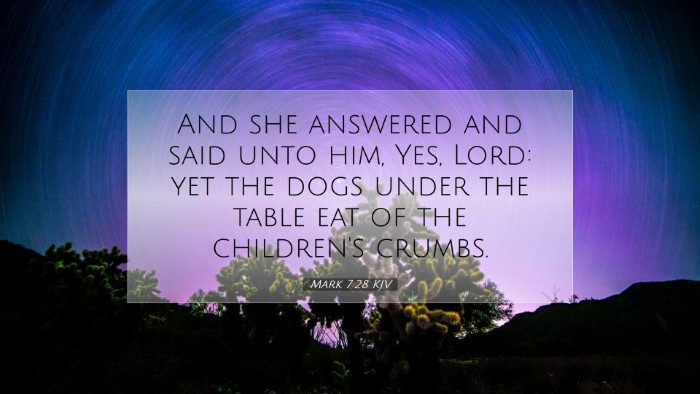Commentary on Mark 7:28
Bible Verse: Mark 7:28 (NIV) - "Lord, even the dogs under the table eat the children’s crumbs."
Introduction
The passage of Mark 7:28 is a profound exchange between Jesus and a Syrophoenician woman. In this encounter, we witness a demonstration of faith that transcends cultural barriers, as well as a teaching moment for the disciples and onlookers regarding the inclusive nature of God's mercy. This commentary synthesizes insights from public domain commentaries to illuminate the depth and implications of this verse for pastors, students, theologians, and Bible scholars.
Contextual Analysis
The setting of this verse is crucial for understanding its significance. Jesus had withdrawn into the region of Tyre and Sidon, predominantly Gentile areas, highlighting His ministry's geographical and cultural extension. The previous verses establish that Jesus was seeking respite but was soon engaged by a desperate mother seeking healing for her daughter possessed by an unclean spirit.
Matthew Henry's Commentary Insights
Matthew Henry emphasizes the faith of the woman, describing her as an example of persevering faith. He notes that her approach to Jesus, characterized by humility and desperation, is essential to understanding her plea:
- Her Humility: Henry observes that she acknowledges her position, recognizing that as a Gentile, she is not among the chosen people of Israel. This is evident in her response, where she likens herself to a dog eating crumbs—a symbol of her humility and desperation.
- Her Faith: Despite being rebuffed by Jesus initially, she persists, which Henry interprets as a testament to her faith. He posits that true faith does not waver in the face of apparent rejection but rather presses into God's grace.
- Covenant and Inclusion: Henry also discusses the implications of her acknowledgment of the covenantal blessings pertaining to Israel and how her faith exemplifies God's mercy beyond traditional boundaries.
Albert Barnes' Commentary Insights
Albert Barnes provides additional layers of understanding regarding the cultural dynamics at play in this passage:
- Cultural Significance: Barnes highlights the social tensions that exist between Jews and Gentiles. He notes that the woman's reference to the 'dogs' under the table carries the weight of cultural identity and classification, indicating she understands her societal standing.
- Spiritual Insight: Barnes suggests that the woman’s response brings to light a profound spiritual truth regarding the nature of God’s blessings. She acknowledges that even the ‘dogs’ receive sustenance, pointing to the truth that God's grace is available to all, regardless of ethnic background.
- Perseverance in Prayer: Barnes describes her fervent request as a model for prayer, where one should not expect to be heard based on entitlement but must approach God’s throne with humility and earnestness.
Adam Clarke's Commentary Insights
Adam Clarke approaches the passage with a pastoral sensitivity that enriches the interpretation:
- Symbolism of Dogs: Clarke identifies the woman’s use of 'dogs' as a significant metaphor, explaining that it represents the non-Jewish communities who, while separate from the covenant, still have access to God’s mercy.
- Remarkable Wit and Faith: He commends the woman for her clever response, pointing out that she cleverly turns the metaphor to her advantage, reflecting her understanding of grace.
- The Role of Disciples: Clarke posits that this encounter serves as an instructional moment for Jesus’ disciples, who were often focused on exclusivity rather than the broader reach of Christ's mission.
Theological Implications
This verse carries significant theological implications for understanding the nature of God’s kingdom:
- Inclusivity of the Gospel: The woman's encounter underscores an essential teaching about the inclusivity of the Gospel. Jesus’ ultimate embrace of her faith signifies that God’s grace is not limited to a specific ethnic or cultural group.
- Faith Beyond Borders: The passage teaches that faith can emerge from unexpected places and that God recognizes and honors genuine faith, regardless of societal boundaries.
- Divine Testing: The interaction can be viewed as a test of faith, demonstrating how trials and challenges can lead to a deeper understanding of and reliance on God’s grace.
Practical Applications
For pastors and spiritual leaders, this passage offers several practical lessons:
- Encouragement of Faith: Encourage congregants to approach God with boldness and humility, reminding them that no one is beyond the reach of God’s mercy.
- Cultivating Perseverance: Teach the importance of perseverance in prayer and faith, using this encounter as a model for unwavering trust in God's provision.
- Welcoming Diversity: Foster a church environment that embraces all peoples, reflecting the inclusivity of the Gospel that extends grace to everyone, regardless of background.
Conclusion
Mark 7:28 serves as a rich text exhibiting the transformative power of faith. Through the insights of Matthew Henry, Albert Barnes, and Adam Clarke, we gain a deeper understanding of the dynamics of faith, humility, and God's inclusive nature. This commentary not only serves academic interest but also provides practical encouragement for the church today.


